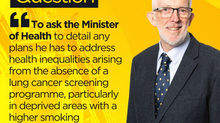Question to the Minister of Health
- stewartdicksonmla
- Aug 21, 2024
- 4 min read

Minister's Answer
I am acutely aware of the workforce challenges that exists across health and social care and therefore welcome the Royal College of Radiologists’ 2023 Workforce Census Reports for Clinical Oncology and Clinical Radiology. I have already agreed to meet representatives from the Royal College to discuss their recommendations in detail, including their predictions relating to retirements and shortfalls in the current and future number of clinical oncologists and clinical/interventional radiologists. This will inform my Department’s ongoing collaboration with the health and social care system on the development of imaging and cancer services.
My Department is committed to the provision of effective imaging and cancer services in Northern Ireland, ensuring patient safety and quality of care. The Strategic Framework for Imaging Services in Health and Social Care (2018) recognised that our existing training mechanism could not deliver the number of clinical radiologists required to meet increasing demand. While much has been achieved over recent years, with training places having been increased by 46% from 37 (2015/16) to 54 (2022/23), the Department recognises that a more innovative approach is required to generate the radiologist workforce required to meet future demand.
After extensive consideration of best practice options, including those set out in the Royal College of Radiology’s Radiology Training 2016 – 2026: A vision and a solution, the Department and HSC are taking forward a proposal for a multi-professional Imaging Academy for Northern Ireland. This will significantly increase the supply of locally trained consultant radiologists and advanced radiographer practitioners to address the increasing demand for imaging investigations and reduce reliance on costly outsourcing.
Following a robust options appraisal process by an independent expert panel, the Mater Infirmorum Hospital site in Belfast HSC Trust has been identified as the optimum location for the proposed Imaging Academy. This would be expected to provide trainees with the additional clinical and office space and full Picture Archiving and Community System access recommended by the Royal College of Radiologists. However, progressing this initiative remains subject to business case approval and the availability of funding (£3.3m is currently earmarked for establishment of the Imaging Academy in the Department’s draft Capital Plan).
Pending the establishment of the Imaging Academy, a costed workforce plan (approximately £6m per annum over the next 3-5 years) for imaging services has also been developed, to bring training within imaging teams, including clinical radiologists, up to date. Regrettably, funding for this programme remains unapproved.
Regarding interventional radiology, the Regional Imaging Board has endorsed a Hub and Spoke model for this service. This will utilise existing resources across the region, optimising specialist care provision to high standards and improving access for patients. The model exists in Belfast HSC Trust and has been extended to the Western HSC Trust. However, there is no dedicated funding to roll this model out across all of Northern Ireland and consequently other HSC Trusts have to rely on creating capacity themselves.
In terms of oncology, A Cancer Strategy for Northern Ireland 2022 – 2032 sets the overall direction. By 2024/25, £10.88m will have already been invested to stabilise HSC Trusts’ oncology and haematology services. This funding has secured an additional 167.6 WTE posts across the full range of healthcare disciplines delivering oncology and haematology services. The resultant growth in whole time equivalent (WTE) Consultant Radiologists, Specialty Doctors, Consultant Radiographers, Specialist Radiographers and Radiographers is shown in the following table.
Stabilisation of HSC Trusts’ Oncology and Haematology Services Increase in WTE funded posts: Consultants/Specialty Doctors/Consultant Radiographers/Specialist Radiographers/Radiographers | ||
Staff type | Oncology | Haematology |
Consultant | 9.75 WTE | 7.58 WTE |
Specialty Doctor | 8.0 WTE | 8.0 WTE |
Consultant Radiographer/Specialist Radiographer | 6.5 WTE | |
Radiographer | 3.0 WTE | |
TOTAL | 27.25 WTE | 15.58 WTE |
GRAND TOTAL | 42.83 WTE |
Specific cancer pathways are currently being developed, which will inform future strategic workforce planning to address workforce requirements for clinical oncologists and other professions.
The Royal College of Radiologists have also identified recruitment and retention as the key elements of their three-point plan to support clinical oncology and clinical radiology. I am pleased to say that my Department’s Health and Social Care Workforce Strategy 2026: Delivering for Our People and its current Second Action Plan contains a comprehensive and ambitious work programme that includes the development of initiatives to enhance our attraction, recruitment and retention across all staff groups and specialties. I look forward to discussion with College representatives on these matters at our forthcoming meeting.
My Department has an extensive range of plans and programmes to develop effective cancer and imaging services in Northern Ireland, supporting the education and training of the medical oncologists, medical radiologists and other professional staff upon which these services depend. However, we can only take forward these ambitious plans if we are funded to do so.
The 2024/25 Budget outcome was extremely disappointing for this Department and is likely to have serious consequences for health and social care, including cancer and imaging services. The additional funding provided was significantly less than what is required and has resulted in 2.3% less funding in 2024/25 than was spent in 2023/24. My Department is currently anticipating a shortfall of £340m, which means some extremely difficult decisions will be required to manage within the allocated budget. The impact has already been felt in that my Department has not able to commission a needed expansion of three places in the August intake to the medical radiology training programme.
In the meantime, until the Department is provided with the additional funding for which I will continue to advocate, we will not be able to do all that we want or know is required, to develop a reformed health and social care system for the people of Northern Ireland.
Our immediate focus will therefore be on preserving and protecting existing services, retaining patient safety at the forefront of service delivery.

































Comments